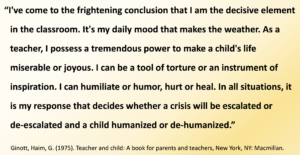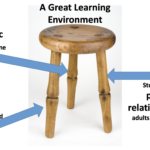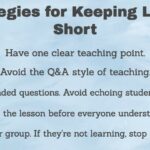Consider a Slight Variation to the Golden Rule

As I work with teachers on helping students craft effective and supportive rules at the beginning of the school year, a question almost always comes up: “What do you think about using the Golden Rule as a classroom rule?” It’s a question that my own students would often ask as we created rules together, and it’s worth considering.
Some worry that because the Golden Rule has religious roots, it shouldn’t be used in schools. However, almost every major religion seems to have a version of the rule somewhere in its texts. Just last year, my son shared with me that there was a poster in one of his seventh grade classrooms which highlighted seven different articulations of this rule, each from a different religion. Though I prefer to err on the side of caution when it comes to using anything religious in the classroom, this isn’t what I struggle with.
My discomfort with using the Golden Rule actually has to do with the rule itself, or least the way the rule us usually stated. The most common version of the rule that I see in schools is: “Treat others the way you want to be treated.” Although it could be argued that this rule encourages students to have empathy for others (think about how you’d feel about something before you say/do it to others), I’ve seen some students push back against this rule. Here are a two examples:
- Jeremy, a fifth grade student, has been accused by a group of classmates of swearing at recess. When reminded of the Golden Rule by the teacher on duty, he replies, “I don’t mind swearing. It’s okay with me!”
- Lisa, a seventh grader who has a lot of social capital, makes snide remarks at a quiet and awkward classmate during science class, eliciting smirks from her friends. The teacher, upset, asks Lisa, “How would you like it if she treated you that way?!” Lisa shrugs and responds, “She can if she wants. I don’t mind.”
By their logic, both Jeremy and Lisa can swear or make mean comments while still following the Golden Rule. (“Treat others the way you want to be treated.”) Whether they are sincerely following or manipulating the rule is beside the point, and their teachers are left with the potential beginnings of a power struggle.
For this reason, I asked my students who wanted to use the Golden Rule as a rule in our class (and now ask teachers who ask the same question) to consider a slight variation: Instead of “Treat others the way you want to be treated,” consider “Treat others the way they want to be treated.” This very slight amendment preserves (I think) the main idea of the rule while shifting students’ perspectives. In order to engage in respectful behavior, students must be thoughtful of others. Jeremy might consider, “Even though I don’t mind swearing, I know others nearby probably don’t like it.” The teacher might respond to Lisa, “Even if you don’t mind sarcastic remarks, Jenny is upset by them. They need to stop.”
So, as you begin to plan for the beginning of the school year, and you consider how you’re going to establish rules with your students, this might be an idea to ponder!





Comments
This is a great way to help develop empathy! Thanks for this!